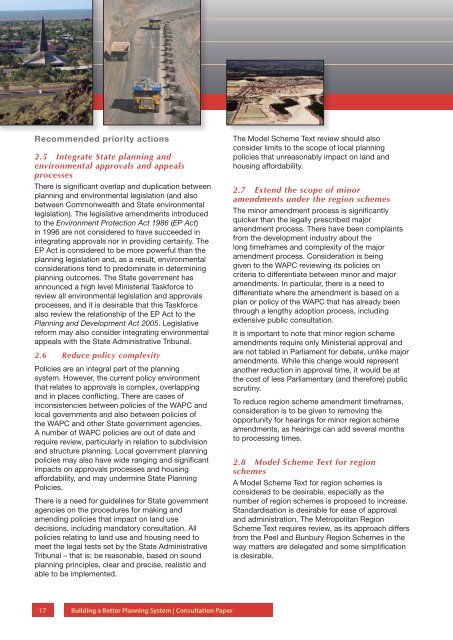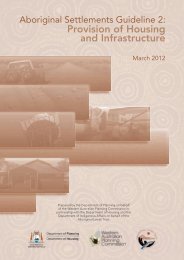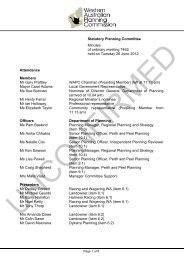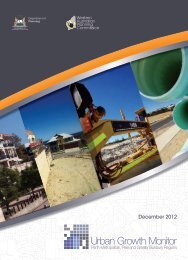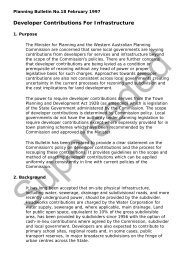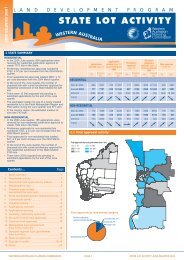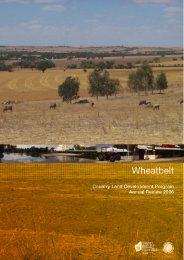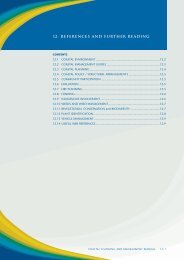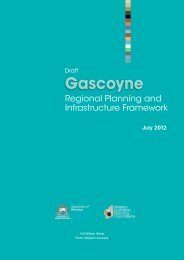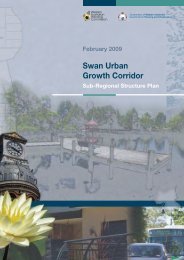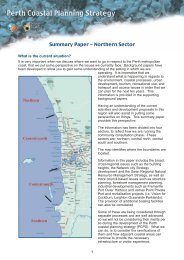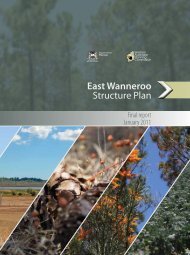Building a Better Planning System - Western Australian Planning ...
Building a Better Planning System - Western Australian Planning ...
Building a Better Planning System - Western Australian Planning ...
Create successful ePaper yourself
Turn your PDF publications into a flip-book with our unique Google optimized e-Paper software.
Recommended priority actions<br />
2.5 Integrate State planning and<br />
environmental approvals and appeals<br />
processes<br />
There is significant overlap and duplication between<br />
planning and environmental legislation (and also<br />
between Commonwealth and State environmental<br />
legislation). The legislative amendments introduced<br />
to the Environment Protection Act 1986 (EP Act)<br />
in 1996 are not considered to have succeeded in<br />
integrating approvals nor in providing certainty. The<br />
EP Act is considered to be more powerful than the<br />
planning legislation and, as a result, environmental<br />
considerations tend to predominate in determining<br />
planning outcomes. The State government has<br />
announced a high level Ministerial Taskforce to<br />
review all environmental legislation and approvals<br />
processes, and it is desirable that this Taskforce<br />
also review the relationship of the EP Act to the<br />
<strong>Planning</strong> and Development Act 2005. Legislative<br />
reform may also consider integrating environmental<br />
appeals with the State Administrative Tribunal.<br />
2.6 Reduce policy complexity<br />
Policies are an integral part of the planning<br />
system. However, the current policy environment<br />
that relates to approvals is complex, overlapping<br />
and in places conflicting. There are cases of<br />
inconsistencies between policies of the WAPC and<br />
local governments and also between policies of<br />
the WAPC and other State government agencies.<br />
A number of WAPC policies are out of date and<br />
require review, particularly in relation to subdivision<br />
and structure planning. Local government planning<br />
policies may also have wide ranging and significant<br />
impacts on approvals processes and housing<br />
affordability, and may undermine State <strong>Planning</strong><br />
Policies.<br />
There is a need for guidelines for State government<br />
agencies on the procedures for making and<br />
amending policies that impact on land use<br />
decisions, including mandatory consultation. All<br />
policies relating to land use and housing need to<br />
meet the legal tests set by the State Administrative<br />
Tribunal – that is: be reasonable, based on sound<br />
planning principles, clear and precise, realistic and<br />
able to be implemented.<br />
The Model Scheme Text review should also<br />
consider limits to the scope of local planning<br />
policies that unreasonably impact on land and<br />
housing affordability.<br />
2.7 Extend the scope of minor<br />
amendments under the region schemes<br />
The minor amendment process is significantly<br />
quicker than the legally prescribed major<br />
amendment process. There have been complaints<br />
from the development industry about the<br />
long timeframes and complexity of the major<br />
amendment process. Consideration is being<br />
given to the WAPC reviewing its policies on<br />
criteria to differentiate between minor and major<br />
amendments. In particular, there is a need to<br />
differentiate where the amendment is based on a<br />
plan or policy of the WAPC that has already been<br />
through a lengthy adoption process, including<br />
extensive public consultation.<br />
It is important to note that minor region scheme<br />
amendments require only Ministerial approval and<br />
are not tabled in Parliament for debate, unlike major<br />
amendments. While this change would represent<br />
another reduction in approval time, it would be at<br />
the cost of less Parliamentary (and therefore) public<br />
scrutiny.<br />
To reduce region scheme amendment timeframes,<br />
consideration is to be given to removing the<br />
opportunity for hearings for minor region scheme<br />
amendments, as hearings can add several months<br />
to processing times.<br />
2.8 Model Scheme Text for region<br />
schemes<br />
A Model Scheme Text for region schemes is<br />
considered to be desirable, especially as the<br />
number of region schemes is proposed to increase.<br />
Standardisation is desirable for ease of approval<br />
and administration. The Metropolitan Region<br />
Scheme Text requires review, as its approach differs<br />
from the Peel and Bunbury Region Schemes in the<br />
way matters are delegated and some simplification<br />
is desirable.<br />
17<br />
<strong>Building</strong> a <strong>Better</strong> <strong>Planning</strong> <strong>System</strong> | Consultation Paper


